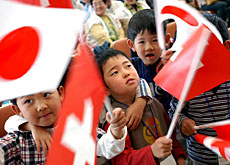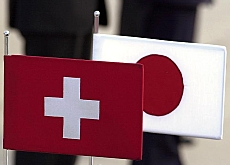Bern and Tokyo discuss free trade accord

Switzerland and Japan have agreed to start free trade talks for what is Tokyo's first attempt at a bilateral trade agreement with a European country.
Despite the collapse of the Doha world trade talks, progress has also been made in negotiations regarding other free trade agreements – Switzerland is set to sign with Egypt next week, and an accord with Canada is also on the cards.
Bern and Tokyo have been studying the possibilities of economic partnership and a free trade accord since October 2005.
A joint study group concluded that such an agreement would significantly enhance bilateral economic relations – including trade in goods, services and investment – and could strengthen the competitiveness of companies in both countries.
During a telephone conversation on Friday, Swiss President Micheline Calmy-Rey and the Japanese Prime Minister Shinzo Abe acknowledged the study group’s report and announced the opening of negotiations.
Japan is seeking to export more electronic goods to Switzerland, while Swiss pharmaceutical and watch-making companies have been looking to boost shipments to Japan.
Hajime Ueda, from the Japanese Foreign Ministry, said a bilateral trade pact with Switzerland that lowers tariffs would greatly benefit Japan because 70 per cent of its exports to the European country are taxed.
Other treaties
It was also announced on Friday that Economics Minister Doris Leuthard, together with the other European Free Trade Association (Efta) ministers from Iceland, Liechtenstein and Norway, would sign the Efta free trade agreement with Egypt at the World Economic Forum (WEF) in Davos on January 27.
The free trade agreement liberalises in particular the trade in goods and will largely eliminate the discrimination of Swiss industrial exports on the Egyptian market that arose from Egypt’s 2004 Association Agreement with the EU.
In addition, negotiations regarding a free trade agreement between the Efta states and Canada, which had been suspended for some time, were resumed last autumn.
Since then considerable progress has been made and the Swiss economics ministry anticipated that these negotiations could be concluded in the near future.
The ministry said an agreement should offer Swiss industries duty-free access to the large Canadian market and provide an institutional basis to further improve bilateral economic relations in future negotiations.
New policy
In October Jean-Daniel Gerber, head of the State Secretariat for Economic Affairs (Seco), said Switzerland was looking to boost its free trade accords with other countries following the collapse in July of the Doha Round of world trade talks.
Analysts said the last-ditch talks between the European Union, the United States, Japan, Brazil, Australia and India failed due to the intransigence of Washington and Brussels to give ground on agriculture.
Switzerland, which has a strong farmers lobby, has always rejected World Trade Organization (WTO) calls to lower farm subsidies and import tariffs on agricultural products, but has pushed for liberalisation of services and lower tariffs for industry.
On Friday Gerber said Switzerland was also pursuing free trade accords with Thailand, Indonesia and the Gulf States.
swissinfo with agencies
Bilateral links have existed since 1864 with the signing of a “Treaty of Amity and Trade”.
During the Second World War, around 20 countries, among them the leading powers of the Allied Nations, entrusted Switzerland with the diplomatic representation of their interests in Japan, and Switzerland represented Japan’s interests towards the Allied Nations.
Switzerland is the fifth-largest foreign direct investor in Japan.
Bilateral agreements cover air traffic, visas, double taxation and good laboratory practice.
A Swiss Business Hub was opened in Tokyo in November 2001.
Japan is Switzerland’s third most important trade partner, after the Europe Union and the United States.
Swiss exports of goods to Japan in 2005 were valued at SFr5.9 billion and imports from Japan at around SFr3 billion.
In terms of services, Japanese statistics for 2005 show exports to Japan of SFr6.3 billion and imports from Japan of SFr2.7 billion.
As of the end of 2005, Swiss direct investment in Japan was valued at SFr7.7 billion, that of Japanese direct investment in Switzerland at SFr1.1 billion.
Free trade is an international trade system which is based on reducing the barriers to the free circulation of goods and services.
Switzerland has followed this policy for a while. In 1960 it joined the European Free Trade Association (Efta).
Most Efta countries have left to join the EU, but Switzerland has not become a member, preferring to conclude bilateral accords with the EU.
Efta (which also includes Liechtenstein, Norway and Iceland) has also concluded free trade agreements with non-European countries such as Singapore, Israel and Chile.
Recent Swiss negotiations with the US on free trade have however stalled.

In compliance with the JTI standards
More: SWI swissinfo.ch certified by the Journalism Trust Initiative











You can find an overview of ongoing debates with our journalists here . Please join us!
If you want to start a conversation about a topic raised in this article or want to report factual errors, email us at english@swissinfo.ch.